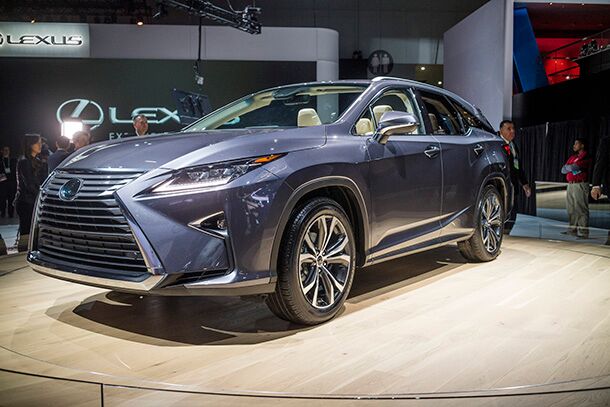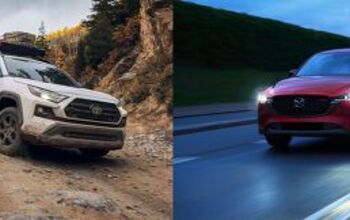Toyota Gaining Ground in Quest for More Light Truck Sales

January was a boffo sales month for Toyota in the United States, with the automaker posting a 16.8 percent year-over-year increase across both the Toyota and Lexus brands. Toyota brand sales rose 17 percent, to the luxury division’s 15 percent.
Don’t expect that kind of growth to continue, says Jack Hollis, Toyota North America’s general manager, as the industry still expects a slump in 2018. More important to Toyota than last month’s sales, however, is the type of vehicles Toyota buyers actually took home. In this case, brand loyalists added crossovers, SUVs, and trucks to their driveway in greater numbers than ever before.
The record set for Toyota light truck sales in the U.S. last month was exactly what the company was hoping for. Still, keeping that truck-buying momentum going is now job one.
Toyota came closer than ever to fixing a persistent product problem last month. As more and more buyers gravitate towards SUVs and trucks, Toyota soon found itself lagging behind the industry average in terms of its cars-to-trucks ratio. Cars — a rapidly shrinking segment — made up too much of Toyota’s sales. Hardly a good way to face the future.
But there’s progress being made on this front. Speaking to Automotive News, Hollis said that over the last four months, American buyers chose light trucks over passenger cars by a ratio of 64:36. Toyota ended 2017 with a sales mix of 58:42. A year earlier, just 53 percent of the company’s U.S. sales were light trucks. In January, however, Toyota cleared the 60 percent bar for the first time, pushing it closer to the industry average (where, presumably, safety lies).
“As we see that, we are gaining more of what the industry is selling,” Hollis said, giving some of the credit for last month’s sales surge to the growing popularity of certain models.
While Toyota brand cars saw a year-over-year sales uptick of 5.7 percent in January, demand for Lexus cars fell by 2.3 percent. Toyota pickup sales rose 27.3 percent, year over year, with growth in Tacoma sales amounting to 33.6 percent. The same trend carried over in Toyota’s SUV division, where sales climbed 26.7 percent compared to the previous January. Only old, low-volume models (Sequoia, Land Cruiser) saw any decrease in sales.
At Lexus, sales of the NX, LX, GX, and RX lines rose a combined 23.6 percent. As we’ve seen recently, Toyota’s pulling out all the stops to make its light truck lineup more appealing to buyers. Besides adding the subcompact C-HR crossover to the stable, the automaker introduced a longer, three-row RX and cheaper, two-row LX, with an improved line of TRD Pro off-road models also on the way. Later this year, we’ll see the redesigned RAV4 — a model already in possession of the “best-selling crossover” title.
Despite earlier efforts to squeeze more Tacomas out of its Texas and Mexico assembly plants, Toyota plans to feed the demand with additional production in the near future.
Actually, it’s likely Toyota would already have reached the industry’s 64:36 truck-to-car ratio, were it not for two names: Camry and Corolla. Those two cars, backed up by decades of name recognition and a solid reputation, continue selling well. Suffice it to say, there’s far worse situations an automaker could find itself in.
[Images: Toyota]

More by Steph Willems
Latest Car Reviews
Read moreLatest Product Reviews
Read moreRecent Comments
- VoGhost Just reminding us all that we have to tolerate dealers (many of whom are billionaires) in the US if we want new legacy ICE vehicles because the dealers pay for the campaigns of local politicians, with our money.
- 1995 SC I'm still trying to get past the fact that the Red Bull guy is married to a Spice Girl.
- Ravenuer Not into F1. Started watching NASCAR back when they raced actual cars. (yeah I'm that old). Not any more. They aren't "stock cars" now. Not even close. Even drag races don't interest me anymore. Races are over in 3 seconds.
- Wjtinfwb No confusion on my end, Ghost. The Government has zero role in job creation outside of the legitimate opportunities' created by Government going about it's responsibilities, namely keeping the American people and territory safe from foreign intrusion. Of course, they're failing epically at that but that's a different topic. The American free enterprise system is what enables job creation. Government's role is to stay out of the way of that system, but they seem incapable of doing so. Oil & Gas exploration is just one example. If a National Job Policy is what you're looking for, there are other countries that will be happy to accept your application for residency.
- Michael Smith I drive 100-300 miles a day in new BMWs, Mercedes-Benzes, and GM SUVs. Some are already equipped with automatic braking.It's the first thing I turn off when I start the car.I've had experiences where (as the author notes) the system gave false alarms and stabbed the brake pedal, threatening my ability to control the car.Further, every driver encounters situations where, for example, legal following distance must be momentarily compromised in order to avoid a difficult situation. When the system intervenes, it disrupts the driver's plan of action. This can lead to a collision as the driver has to suddenly react not to his surroundings, but to the system.Not only is automatic braking an insult to skilled drivers, it's dangerous to everyone.



































Comments
Join the conversation
So Toyota's upping their game in the light truck segments, while increasing passenger car sales in the face of declining sales in that segment. Shocker. The only segments Toyota hasn't mastered are the full-size Pickup and SUV segments. They have entries, but the domestic brands still own these segments. I don't see that situation changing anytime soon.
GM, Ford & FCA had better watch their backs, as Toyota is sneaking up with their trucks. Some love them, others won't go near them, but whoever proves their product reliability is best, they may win in the long run. Me? I still prefer GM, but not like I used to. Being retired, I've bought my last new car, and whatever I replace my 2012 Impala with is anybody's guess. Many preach the gospel of Toyota, but their products simply don't "speak" to me. Who knows? Time will tell.